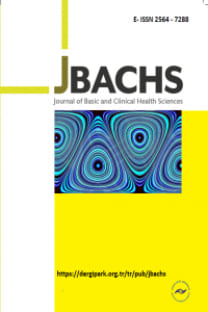The Effect of Aromatherapy and Abdominal Massage Applied to Infants on Constipation and Maternal Anxiety Level
Abdominal massage, aromatherapy, constipation,
___
- 1. Arikan D, Çelebioğlu A, Tüfekçi FG. Çocukluk döneminde büyüme ve gelişme. Içinde: Conk Z, Başbakkal Z, Yilmaz HB, Bolışık B (Editörler). Pediatri Hemşireliği, 1. Baskı, Ankara, Akademisyen Tip Kitap Evi,2013;66.
- 2. Sökücü S. Çocuklarda kabızlık ve enkoprezis. İçinde: Ekşi A (editör). Ben Hasta Değilim Çocuk Sağlığı ve Hastalıklarının Psikososyal Yönü, 2. Baskı, İstanbul, Nobel tıp kitapevleri, 2011;435.
- 3. Sökücü S, Sindirim sistemi ve hastalıkları, çocuklarda sindirim sisteminin özellikleri. İçinde: Neyzi O, Ertuğrul T (Editörler). Pediyatri, 4. Baskı. Istanbul, Nobel Tıp Kitap Evleri, 2010; 895.
- 4. Kutlu T. Fonksiyonel bağırsak hastalıkları, Türkiye Klinikleri J Pediatr Sci, 2007, 3:1-9.
- 5. Howarth LJ, Sullivan PB. Management of chronic constipation in children. Paediatrics and Child Health, 2016, 26: 415–422.
- 6. Sökücü S, Saner G, Durmaz Ö. Sindirim sistemi ve hastalıkları, semptomatoloji. İçinde: Neyzi O, Ertuğrul T (Editörler). Pediyatri, 4. Baskı. Istanbul, Nobel Tıp Kitap Evleri, 2010; 912.
- 7. Moquin B, Blackman MR, Mitty E, Flores S. Complementary and alternative medicine. Geriatric Nursing, 2016, 30: 196–203.
- 8. Gnatta JR, Kurebayashi LFS, Turrini RNT, Da Silva MJP. Aromatherapy and nursing: historical and theoretical conception. Revista Da Escola De Enfermagem, 2016, 50: 127–133.
- 9. Turan N, Astı TA. The effect of abdominal massage on constipation and quality of life, Gastroenterology Nursing, 2016; 39: 48-59.
- 10. Lamas K, Lindholm L, Stenlund H, Engstrom B, Jacobsson C. Effects of abdominal massage in management of constipation - A randomized controlled trial. International Journal of Nursing Studies, 2009; 46: 759–767
- 11. Moss L, Smith M, Wharton S, Hames A. Abdominal massage for the treatment of idiopathic constipation in children with profound learning disabilities: a single case study design, British Journal of Learning Disabilities, 2007; 36: 102–108.
- 12. Silva CAG, Motta MEFA. The use of abdominal muscle training, breathing exercises and abdominal massage to treat paediatric chronic functional constipation. The Association of Coloproctology of Great Britain and Ireland. 2013;15: e250–e255.
- 13. Nam MJ, Bang Yl, Kim TI. Effects of abdominal meridian massage with aroma oils on relief of constipation among hospitalized children with brain related disabilities. Journal of Korean Academy of Nursing, 2013; 43: 247-255.
- 14. Wang X, Yin J. Complementary and alternative therapies for chronic constipation. Evidence-Based Complementary and Alternative Medicine, 2015, 1-11
- 15. National Collaborating Centre for Women‘s and Children‘s Health, Constipation in children and young people: diagnosis and management of idiopathic childhood constipation in primary and secondary care, 2010, London.
- 16. Chan MF, Chan YL. Investigating factors associated with functional constipation of primary school children in hong kong. Journal of Clinical Nursing, 2010, 19: 3390–3400.
- 17. Olaru C, Diaconescu S, Gimiga N, Tataranu E, Lacatus A, Burlea M. Diagnosis and management in chronic constipation in children age (Part II). Revista Românå De Pediatrie, 2013, 62: 263–266.
- 18. Ferrara LR. Constipation in children: Diagnosis, treatment, and prevention. The Nurse Practitioner, 2011, 42: 31–34.
- 19. Öner N, Le Compte A. Durumluluk Sürekli Kaygı Envanteri El Kitabı, 2. Baskı, İstanbul, Boğaziçi Üniversitesi Yayınları, 1985: 333.
- 20. Carpenito- moyet LJ, Handbook of nursing diagnosis. Çeviri: Erdemir F. hemşirelik tanıları. İstanbul, nobel tıp kitapevi, 2012: 281-286.
- 21. Preece J. Introducing abdominal massage in palliative care for the relief of constipation. Complementary Therapies İn Nursing And Midwifery, 2002; 8, 101–105. 22. Ayas S, Leblebici B, Sozay S, Bayramoglu M, Niron EA. The effect of abdominal massage on bowel function in patients with spinal cord injury. Am J Phys Med Rehabil, 2006; 85 , 951-955.
- 23. Baykan Z, Kondolot M, Baykan A. Sağlıklı bebeklerde yaşamın ilk dört ayında ağlama davranışı, ailelerin ağlamaya yaklaşımları ve bebeklerini sarsma durumları, Türkiye Çocuk Hastalıkları Dergisi, 2017; 3: 159-164.
- 24. Stock A, Chin L, Babl FE, Bevan CA, Donath S, Jordan B. Postnatal depression in mothers bringing infants to the emergency department. Archives of Disease in Childhood, 2013, 98:36- 40.
- 25. Akman I, Kusçu K, Ozdemir N, Yurdakul Z, Solakoglu M, Orhan L, Karabekiroglu A, Ozek E. Mothers’ Postpartum Psychological Adjustment and Infantile Colic, Archives of Disease in Childhood, 2006, 91, 417-419.
- 26. Lai TKT, Cheung MC, Lo CK, Ng KL, Fung YH, Tong M, Yau CC. Effectiveness of aroma massage on advanced cancer patients with constipation: A pilot study. Complementary Therapies in Clinical Practice, 2011: 37-43.
- 27. Des Jarlais, D. C., Lyles, C., Crepaz, N., & the Trend Group (2004). Improving the reporting quality of nonrandomized evaluations of behavioral and public health interventions: The TREND statement. American Journal of Public Health, 94, 361-366.
- Yayın Aralığı: 3
- Başlangıç: 2016
- Yayıncı: DOKUZ EYLÜL ÜNİVERSİTESİ
Esra DUĞRAL, Oguzhan Ekrem TURAN, Ahmet Anıl BAŞKURT, Emin Evren ÖZCAN
Tuba GIYNAŞ, Nurdan AKÇAY DİDİŞEN
Nevin HOTUN ŞAHİN, Hüsniye DİNÇ
Nazlı Büşra CİĞERCİOĞLU, Ezgi ÜNÜVAR, Polen HAZİMLİOGLU, Fırat TAN, Hasan Erkan KILINÇ, Hande GUNEY DENİZ
Bennur KOCA, Aynur UYSAL TORAMAN
